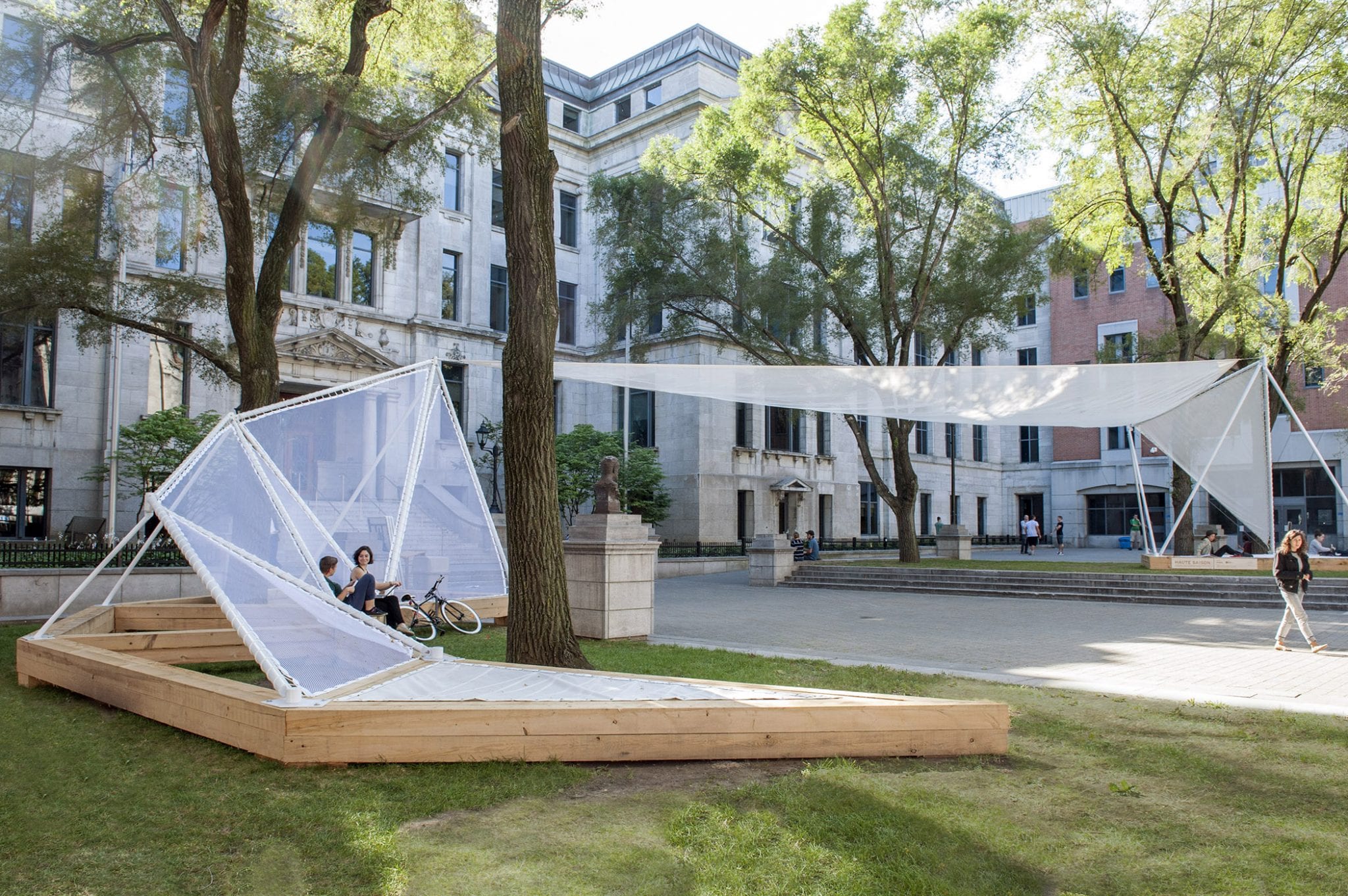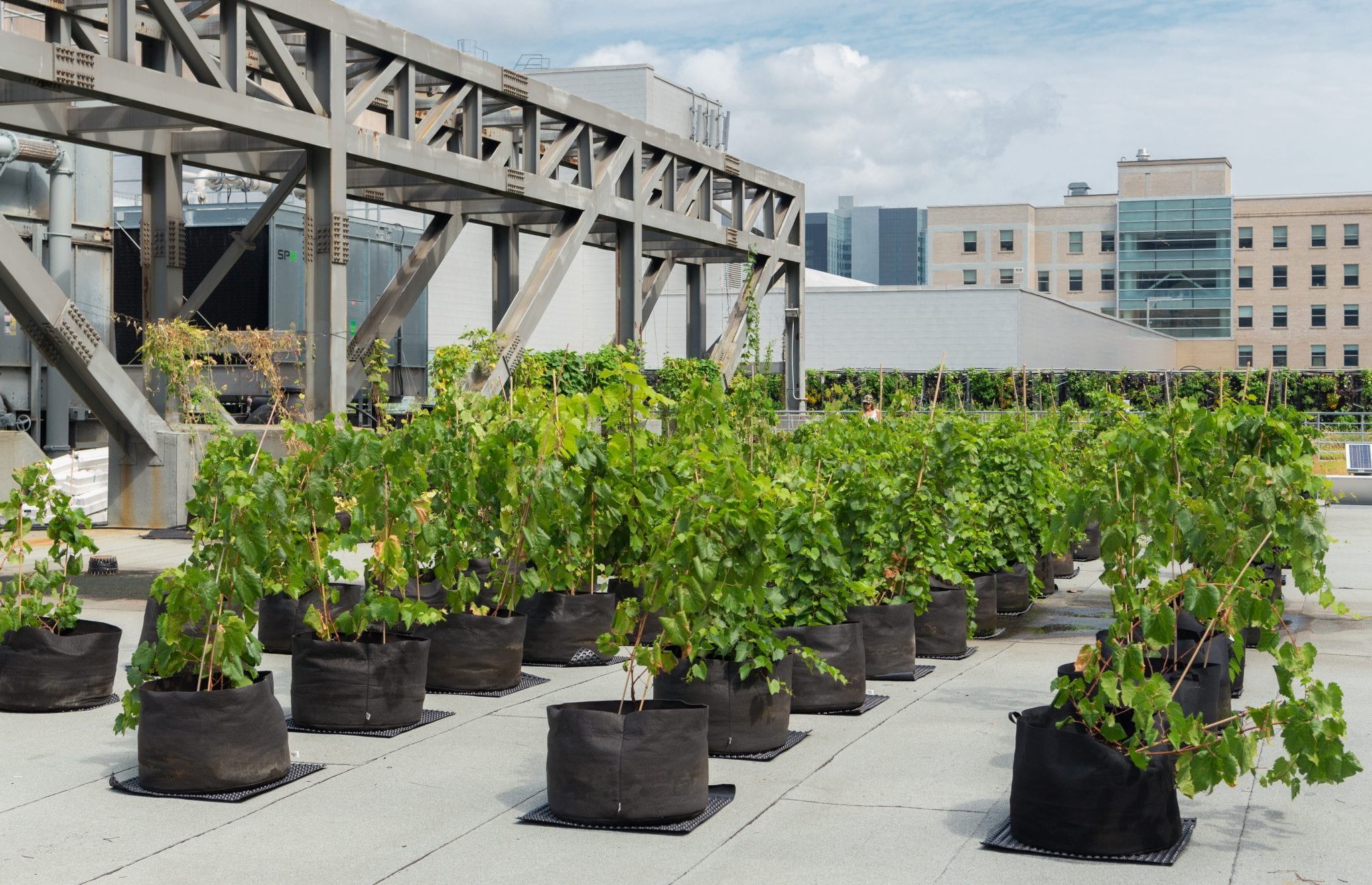An urban university par excellence, with an annual enrollment of nearly 40,000 students, the Université du Québec à Montréal (UQAM) has made social impact innovation central to its identity and development. With its expertise and its many innovative projects, UQAM is proud to play a role in strengthening Montreal’s positioning. Here are just a few examples.

UQAM, a catalyst of innovative solutions for Montreal
Committed to the socio-economic and cultural development of Montreal, UQAM is an innovative creative force, thanks to the talent within its own community and its collaborations with key players in the city. Whether in heritage, transportation, numerical technology or tourism, to cite just a few, the expertise of its professors contributes to the understanding of urban issues and the development of new solutions for a diversity of communities.
Each year, UQAM professors and students enliven public spaces through ephemeral architectural installations and creative projects exhibited during Montreal’s major festivals. Three facades of the University’s buildings also are integrated into the large Quartier des Spectacles projection network.
In 2017, in partnership with Tourisme Montréal and the City of Montreal, the University established MT Lab, the first incubator in North America devoted to tourism, culture, and entertainment. Its mission is to mentor fledgling startups in different fields from Quebec, Canada and abroad in order to provide innovative solutions to the challenges facing these three industries. The new ideas emerging from this incubator will enhance the city’s attractiveness by exploiting the innovative energy of young entrepreneurs.

Towards a responsible development of artificial intelligence
Artificial intelligence (AI) has permeated most segments of society. Although the contribution of AI to social and economic progress is undeniable, it is also essential to ensure the harmonious and responsible social appropriation of the new developments that it will engender.
For this reason, UQAM has created HumanIA, a multidisciplinary group of researchers concerned with social and ethical issues associated with the technological developments of AI. In addition to having signed an appeal for the implementation of public policies on this issue, these researchers co-direct the LegalIA project for the responsible and ethical development of AI in the fields of law and justice. Their primary goal is to measure potential data biases by examining how they are produced.
UQAM researchers are also looking into the issue of access to justice, including the possibility of designing a chatbot, capable of using natural language, who would direct citizens to the relevant legal resources and documents to meet their needs.

At the forefront of urban agriculture
Located in the heart of Montreal, UQAM, like its metropolis, is at the forefront of urban agriculture, as evidenced by its Laboratoire sur l’agriculture urbaine (AU/LAB), an urban agriculture lab. Its researchers oversee the rooftop lab at the Palais des Congrès in Montreal, which won the AIPC Innovation Award in 2017.
Enabling the testing of new technologies, this lab aims to reduce urban heat islands, improve downtown air quality, and encourage property owners to take action on greening their roofs. It includes a technological showcase of green roofs and container vegetable gardens, pollinator beehives, a system of vertical cultivation densifying vegetable production over an area of 6,000 f.2, as well as a vineyard, the second of its kind in the world.
AU/LAB also coordinates an urban agriculture research, expertise, and knowledge transfer centre, the Carrefour de recherche, d’expertise et de transfert en agriculture urbaine (CRETAU), whose objective is to promote the efficiency, profitability and competitiveness of businesses engaged in urban agriculture.

Intelligent transport: new answers to mobility issues
Metropolises like Montreal are seeking new answers to their mobility issues. The Chaire en stratégies intégrées transport-urbanisme (In.SITU) at the UQAM School of Management (ESG UQAM) is dedicated to a new area of research in the field of urban policy: the integration of planning, urbanization and sustainable transport strategies.
In.SITU is also at the heart of a research partnership that offers internships to students interested in issues of sustainable, intelligent mobility. The objective is to evaluate tools and methods to make the best use of data from different technologies, ensuring that they meet people’s needs as well as conditions of social appropriation and acceptability.
Researchers at UQAM are also investigating urban logistics, with research projects that offer new models by studying the case of Montreal and collaborating with colleagues in the United States, Italy, and Norway.

Urban forests improving the quality of city life
The importance of urban forests for the well-being of the population is increasingly recognized. Trees filter the air, reduce heat islands, diminish noise, increase property values, contribute to mental health, and shelter a multitude of living organisms that brighten our urban lives.
It is therefore important to determine the best tree assemblages to promote growth and resistance to environmental stresses and thus create true mini-ecosystems. This is one of the mandates of the Chaire de recherche CRSNG/Hydro-Québec sur le contrôle de la croissance des arbres.
Among its projects, this Chaire is developing a computer kit that will help in decision making for tree planting and urban forest management. The kit will include an analysis of diversity deficiencies in each municipality and a geospatial database that is consistent with the geographic information systems used in cities.















